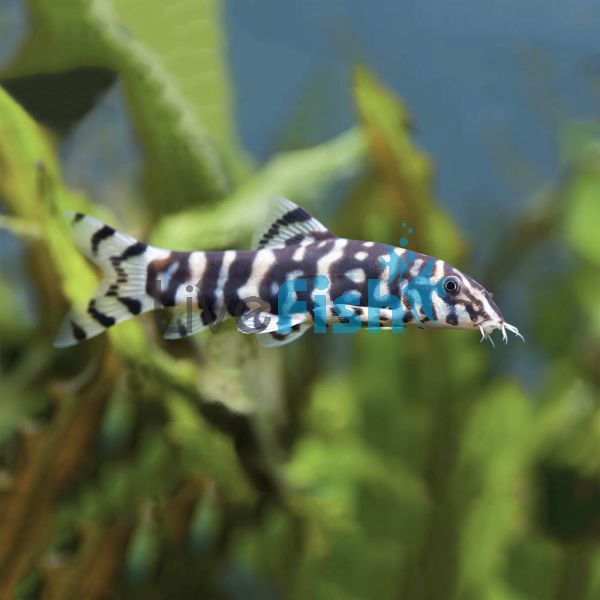Pakistani Reticulate Loach 4cm
The Pakistani Reticulate Loach, more commonly known as the Yoyo Loach, is a lively and contrasting freshwater fish named for the distinct "Yoyo" pattern on its body. Native to slow-moving rivers and streams in South Asia, this loach is a popular addition to community tanks due to its playful nature and striking appearance. Its activity level and unique behaviour make it an engaging species for aquarists, but it does require specific care to thrive.
- Buy 10 for $11.99 each and save 20%
Pakistani Reticulate Loach
The Pakistani Reticulate Loach, more commonly known as the Yoyo Loach, is a lively and contrasting freshwater fish named for the distinct "Yoyo" pattern on its body. Native to slow-moving rivers and streams in South Asia, this loach is a popular addition to community tanks due to its playful nature and striking appearance. Its activity level and unique behaviour make it an engaging species for aquarists, but it does require specific care to thrive.
The Yoyo Loach is a medium-sized loach with an elongated body, it's coloration consists of a white base with bold black markings that often resemble the letters "Y" and "O," giving rise to its common name. As the loach matures, the pattern becomes more intricate, sometimes resembling a reticulated network of lines. The fins are transparent, with subtle markings that complement the overall appearance. Yoyo Loaches can grow up to 12-15 cm in length, with males typically slimmer and slightly smaller than females.
Yoyo Loaches are highly social and active, often seen darting around the tank or foraging at the bottom. They are naturally inquisitive and enjoy interacting with tank mates and exploring their environment. Keeping them in groups of at least 5 is essential, as they are naturally shoaling fish. While generally peaceful, Yoyo Loaches can show mild territoriality, especially during feeding. Breeding in captivity is rare and not well-documented, but it is believed to involve specific triggers such as temperature and water chemistry changes. Females that are ready to spawn may appear plumper than usual.
Tank Recommendations for your Pakistani Reticulate Loach
A tank of at least 150 litres is required to comfortably house a group of Yoyo Loaches. The substrate should be soft sand or fine gravel to protect their sensitive barbels. Decorate the tank with driftwood, rocks, and plants to create hiding spots and replicate their natural habitat. Yoyo Loaches thrive in clean, well-oxygenated water with a moderate flow, so a good filtration system is essential. They prefer a temperature range of 24-28°C and a pH between 6.5 and 7.5.
Suitable Tank Buddies
Yoyo Loaches are generally peaceful and do well in community tanks with similarly sized and temperamentally compatible species. Avoid housing them with very small or delicate fish, as their active behaviour can sometimes stress timid tank mates.
Usually Compatible
Medium-sized schooling fish like tetras, barbs, and rasboras are excellent companions. Other peaceful bottom-dwellers such as Corydoras catfish or plecos can also coexist well. Gouramis and non-aggressive cichlids like Keyhole or Bolivian Rams may also make suitable tank mates.
Sometime Compatible
Larger or semi-aggressive species, such as angelfish or some barbs, may coexist with Yoyo Loaches in a spacious tank but require monitoring for signs of stress or aggression.
Rarely Compatible
Territorial or aggressive species such as large cichlids, or very small, delicate fish like neon tetras, are poor choices as tank mates. Additionally, avoid housing Yoyo Loaches with slow-moving species that may become overwhelmed by their activity.
Feeding your Pakistani Reticulate Loach
Yoyo Loaches are omnivores with a hearty appetite and a preference for variety. They will readily accept sinking pellets, wafers, and flakes but also appreciate live or frozen foods such as bloodworms, brine shrimp, or daphnia. As natural scavengers, they will forage for uneaten food, though they should not be relied upon solely as tank cleaners.
| Scientific Name | Botia Lohachata |
|---|---|
| Care Level | Moderate |
| Common Names | Yoyo Loach, Pakistani Loach, Reticulate Loach |
| Diet | Omnivore |
| Fish Family | Botiidae |
| Lifespan (years) | 10 |
| Max. Length (cm) | 15 |
| Min. Tank Volume (l) | 70 |
| Origin | Southeast Asia |
| Sociability | Peaceful |
| Venomous | No |
| Water Conditions | 20-24°C, pH 6.5-7.5 |




